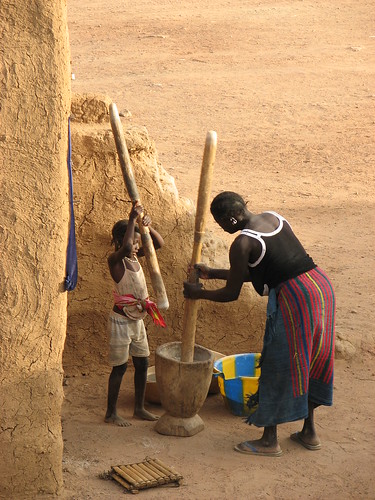In the developed world, everything works. The power is always on, and most things are on time. The economists tell us we’re actually more efficient at just about everything; a quick look at a table of GDP per capita shows that the developed countries make dozens of times more money per person than the poor countries. Now I know that GDP isn’t everything; I know that money doesn’t always measure what actually matters. Still, I have to wonder at the implication that some countries do so much more per person than others. Now that I’ve traveled a bit, I know that it’s completely true. It really does take more work to get anything done in a less developed place.
In the West-African country of Mali, the staple food is rice, which has a husk that must be removed before eating. The women do this work, manually, by using large mortars and wooden pestles. It takes hours to prepare a single meal this way.

There are other examples.
In Dakar I went to the station to find out when the next train to Bamako ran. There was no posted schedule; I had to ask around for the station manager, who shrugged and told me, “Sunday night, maybe monday,” and refused to get any more specific than that. I could have shown up at the station with my baggage on a Sunday afternoon and waited 18 hours. This is what the Senegalese do. In a developed country I would have arrived fifteen minutes before the scheduled departure; in a developed country I would have been able to check the schedule online. Just catching a train could have taken up an entire day of my life in Africa.
So I took the bus. The bus had no glass in the windows, and when we hit the unpaved section of road near the border, the tires kicked up dust which covered all the passengers in red clay. Luckily, we did not break down. On my taxi journey from Chinguetti to Nouakchott in Mauritania we had six flat tires, because the right-front wheel was out of alignment. It was probably out of alignment because no one had the cash to repair it at the time.
In India I foolishly showed up at the hardware store at the posted opening hours. It wasn’t open, and when I inquired of the people within they just shrugged and told me to wait. In Jakarta all but the most expensive shops seemed to hold random opening hours; sometimes they would be open late into the night as the owners ate dinner, played with their children on the market floor, or drank warm Bintang beer on cheap wooden tables. At other times no one would show up all day.
Where there are no phones you can’t even call to check if the market is open before you haul your donkey fifty kilometers to sell your vegetables.
In Jamaica they laugh at the very idea of a schedule.
In Morocco they say that a man who hurries has one foot in the grave.
It’s a nice way to live. It’s an unhurried, slower, simpler life. It’s something endlessly idolized, universally craved by the overworked American (and yes, Americans really do work more and longer hours than those lazy Europeans.) Being unhurried and unserious about work is a lovely way to live, unless you actually need to get something done.
Building a house. Building a hospital and performing the surgeries. Making a movie. Heading to the dry cleaners, the bank, the post office, and your 4:00 all on the same day. Getting anywhere on time, ever. Trusting that the power will be on. Trusting that your cheaply-made motorbike won’t suddenly seize in the monsoon humidity.
The modern world is a clockwork. We built it, then forgot that we did. We have machines, we have systems, we have telecommunications which eliminate the need for transport, and we have transport that works flawlessly when we can’t eliminate it. We have opening hours that matter and schedules we take seriously. We have to-do lists and subdivided days in a hundred productive pieces. In Africa, they’re still hitting rice with sticks. I don’t know if this is good or bad, but it does make them poor.
“In Africa, they’re still hitting rice with sticks. I don’t know if this is good or bad, but it does make them poor.”
uh, no. they’re poor so they can’t simply BUY white rice from the grocery directly. you have it ass backwards.
Take all those people hitting rice with sticks. Train 2% of them to be mechanics. Have those people run rice-hulling machines to make enough rice for everyone. The other 98% can now work on something else, something that can be traded for something other than rice.
It’s a question of hour much each hour of human labor can produce in terms of living standards. If half of the population is doing manual labor just to eat, there’s not going to be much of value to trade with other countries, and the country will stay poor.
Of course, this is all easier said than done. As you point out, there are many vicious cycles keeping these people poor. For example, who pays for that education? And who pays for those machines? And how does the wealth from technological upgrades get distributed?
– Jonathan
And what are the fall-outs of mechanization?